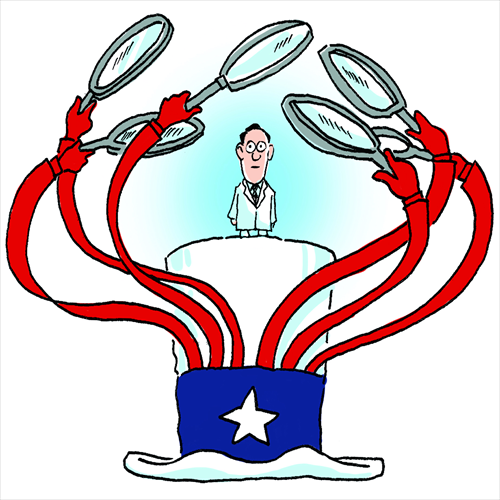HOME >> OP-ED
Paranoia about Chinese bad for US science
By Rong Xiaoqing Source:Global Times Published: 2015-9-17 19:28:01

Illustration: Liu Rui/GT
The US Justice Department on September 11 dropped all the charges against Xi Xiaoxing, a Chinese-American physicist who was suspected of sending classified information about a new technology to scientists in China. Xi went through a nightmare after being arrested at his home in Philadelphia in May, and all because investigators and prosecutors lack expertise in the field of physics. They mistook that the transfer of far from controversial information was in fact highly sensitive material, and that regular communications among scholars were actually international espionage exchanges. And they didn't ask for help from people who could have put them right.This is certainly not the first time US prosecutors have had red faces after chasing down Chinese-American scientists who they suspected had been spying for China. In 1999-2000, nuclear scientist Wen Ho Lee experienced an even worse situation. He was detained in solitary confinement without bail for about nine months and eventually the government dropped all but one minor charge out of a total 59 counts he faced. Lee won $1.6 million compensation from the federal government and some media organizations and an apology from a federal judge.
In recent years, more Chinese Americans in science got into trouble on the same suspicions. Another recent victim is Sherry Chen, a hydrologist working at the National Weather Service who was arrested last October on suspicions that she was collecting information for China. All charges were dropped in March. And there are other pending cases against Chinese-American scientists too.
It is all a clear sign that not only has their adoptive country never shown much trust in them, but that lack of faith is now rising.
To be sure, this is a sensitive time between the US and China over technology security. The US, considering itself a major target of Chinese hackers, charged five Chinese military officials over alleged cyber attacks. And it is now considering whether to sanction some Chinese companies suspected of cyber espionage.
In an example of how deep mistrust is between the two nations, consider what has happened to the US government's view of one of New York's premier hotels. When he comes to New York for the United Nations General Assembly this month, US President Barack Obama won't be staying in the Waldorf Astoria Hotel, as he and previous US presidents have done in the past, for security reasons. What has changed? It was bought by a Chinese company and the Americans fear that means it could be more easily bugged by the Chinese government.
The US certainly has the right and obligation to protect its classified information. But it also has an obligation to curb a growing paranoia.
The Committee of 100, an organization of high achievers among Chinese Americans, sent a joint letter with six other major Asian American organizations to Attorney General Loretta Lynch earlier this month, asking her to investigate whether Chinese Americans are targeted in the recent wave of investigations and prosecutions because of their racial background.
Some are certain they know that is the case. "They came across a person of Chinese descent and a little bit of evidence that they may have been trying to benefit the Chinese government, but it's clear there was a little bit of Red Scare and racism involved," Peter J. Toren, a former federal prosecutor who specializes in computer crimes and industrial espionage, told The New York Times in May when he was interviewed for a story about Chen.
When asked about Xi's case, Peter Zeidenberg, the lawyer represented both Xi and Chen, also acknowledged to The New York Times: "If he was Canadian-American or French-American, or he was from the UK, would this have ever even got on the government's radar? I don't think so."
The message these cases send to the community is so different from the one that comes from the naturalization ceremonies here. The president sends greetings to new citizens on a giant screen and immigration officials shake hands with each of them, saying "welcome" and "congratulations." At many such events I have covered as a reporter, I have seen many attendees, including those from China, waving American flags with happy tears in their eyes.
But the pride and faith of new citizens in this country could easily be destroyed by a false case or two which reveal that because of where they are from they are not trusted as much as fellow citizens.
Should this happen, it would be a major loss for the US. This is a country that badly needs talents in the science, technology, engineering and maths areas. And there are many Chinese who are experts in these fields.
This summer the US team defeated China and won the first place in the prestigious International Mathematical Olympiad, the first time in 21 years. Two of the team of six high schoolers were Chinese Americans. And their head coach was a Chinese American who used to be a member of the US national team himself.
It would be funny if it wasn't so tragic and stupid. How shortsighted can the US get?
The author is a New York-based journalist. rong_xiaoqing@hotmail.com
Posted in: Columnists, Viewpoint, Rong Xiaoqing